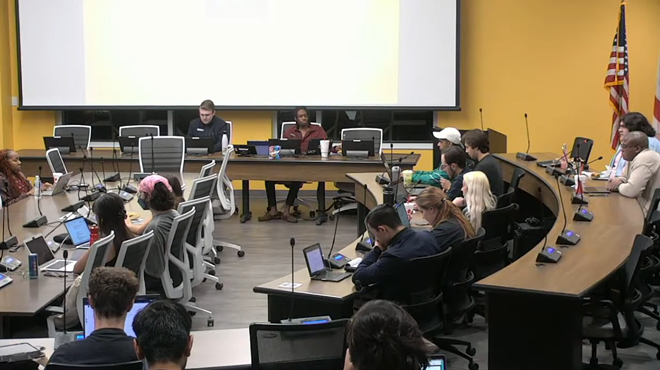The University of Central Florida’s student legislative branch last week voted to approve a resolution demonstrating student opposition to Florida’s “Stop the Wrongs to Our Kids and Employees Act,” a bill signed into law by Gov. Ron DeSantis last year.
The Stop WOKE Act, or HB7, restricts classroom instruction on race and discrimination, as well as diversity training in business settings. The law, which is facing ongoing legal challenges, was championed by DeSantis, who’s rumored to be preparing for a run for president. Its chilling effects are already apparent on public university faculty and the future of college education for Florida students.
The UCF student resolution, first heard by the Student Body Senate in January, was passed by the Student Body Senate almost unanimously on its third hearing, with 32 students voting to approve, and one voting against it.
Sponsored by the UCF Student Black Caucus and the UCF Chapter of the NAACP, among others, the resolution denounces the idea that college students can be so easily “indoctrinated” — as implied in HB7’s language — and demonstrates the student body’s support for protecting academic freedom.
The resolution affirms that it’s “the opinion” of the student Senate that UCF faculty shouldn’t be disciplined for teaching materials considered counter to Stop WOKE, that the university should provide faculty with training to ensure their full understanding of the law, that the university should abstain from canceling classes that could be considered counter to the law, and that the law “should be given further clarity to address the ambiguity and uncertainty” that’s already led to both confusion and fear among university faculty.

UCF Student Government/YouTube
UCF students discuss resolution related to Florida’s Stop WOKE Act at Feb. 2, 2023 student government meeting.
Grace Castelin, a UCF student senator, political science major and vice chair of the UCF Student Black Caucus who introduced the resolution, told Orlando Weekly she brought this to the student government because she’s worried about the impact HB7 will have on the future of college education for Floridians — and the effects it already has had on instruction at her public university, including the removal of anti-racist statements from UCF department websites and course cancellations.
When the 20-year-old student senator first heard of HB7, it made her think back to her favorite class her freshman year at UCF, which covered critical race theory. “The class really brought a lot of awareness to me,” she said, educating her on disparities between different economic groups and minority groups.
Now, she worries that class would no longer exist. And that, due to faculty’s fear of reprimand, college courses teaching on subjects of race or injustice could become watered-down, whitewashed or just eliminated altogether, leading to greater ignorance of the systemic effects of past history on the present day.
“It’s very scary,” said Castelin, who’s also Political Action co-chair of UCF’s chapter of the NAACP.
“I was having hope that we were going to, you know, raise a generation who will be more open-minded and more progressive and, you know, actually more considerate of one another and one another’s cultures,” said Castelin, “but the way it’s going and the ideology that has been pushed lately by the Legislature, it seems that that future generation might not exist anymore with everything that’s happening.”
The University of Central Florida, located in Orlando, is Florida’s largest university by enrollment, with over 68,000 students, 12,000 employees, and an operating budget of $2 billion.
The resolution passed by the student government is not representative of the university, which is governed by the Florida Board of Governors. Of the 17 members on that board, 14 are appointed by the governor.
Dr. Robert Cassanello, a professor of history at UCF and a plaintiff in a lawsuit against the state of Florida over HB7, also sponsored the student resolution. Last week, he underscored the importance to students of having their voices heard on this issue.
“People have heard from the politicians who villainized us, made us out to be quote-unquote ‘indoctrinators,’” said Cassanello, who’s also president of UCF’s full-time faculty union, the United Faculty of Florida-UCF. “We’ve heard from the professors this has impacted, and I really haven’t heard from the students that this affects. And I think we need to hear from you, because there are lawmakers in Tallahassee who seem to think that you all have fragile minds, and you can’t think for yourself.”
“I stand in awe of you,” he added, comparing their resolution to past examples of actions against racism and conservative attacks on Florida’s higher education system.
Like, for instance, the time female students at the Florida State College of Women (as FSU was then known) in the early 20th century — dubbed “filthy dreamers” by religious activists — dared to fight back against a smear campaign by religious fundamentalists, who accused the college “of teaching atheism, free love, and other “unchristian” values to its students” amid debates over the teaching of evolution in classrooms.
And in the 1920s, when the head of the Board of Control (the equivalent of today’s Board of Governors) pulled aside Nathan B. Young, then president of historically Black college Florida A&M, per Cassanello, and told him there “was no point” in teaching young, Black students liberal arts, science and literature, because Black students’ only place was in manual labor.
Young pushed back against white officials’ attempts to undercut Black students’ liberal arts education, which wasn’t taken well. The board fired him from the position in 1923. But at least, said Cassanello, “We had a leader, a top leader of a college, take a stand and say to the Legislature, ‘What you’re doing, what you’re doing is wrong.’”
Students at other Florida colleges and universities in recent months have also demonstrated against attacks on Florida’s higher education system, including a state probe into universities’ diversity programs, transgender healthcare services provided by universities, and DeSantis’ appointment of Christopher Rufo, a conservative activist who launched the crusade against critical race theory (the primary target of ‘Stop WOKE’), to the New College’s board of trustees.
But, to Castelin’s knowledge, no other student government in Florida has passed a resolution like theirs in opposition to HB7.
It didn’t pass without some concern regarding potential ramifications. Ethan Temple, chair of the UCF Student Senate’s Government Affairs & Policy committee, tried to amend Castelin’s resolution language to remove its mention of anti-CRT activist Rufo. Rufo is listed within the resolution as one of several entities a copy of the resolution will be sent to, in addition to UCF’s President, the UCF Board of Trustees, Gov. DeSantis, and the Florida Board of Governors, among others.
“I know that seems rather counterintuitive,” said Temple, who’s listed as a sponsor of the resolution. But Temple was concerned that Rufo would retaliate against UCF if he caught wind of the resolution, pointing to Rufo’s explosive call-out of Florida State University’s diversity programs on Twitter last week.
“If we were to call him out by name, he would actively use that to spin some weird thread that UCF is out to get him personally,” said Temple.
But Castelin, and several other students, opposed the emendation, arguing that calling out CRT critics like Rufo was literally the point of the resolution. “Removing someone because of the fear of pushback is the real reason why we have to make a resolution like this,” said one student senator.
Castelin told Orlando Weekly on Tuesday that she “definitely” wanted Rufo to see this. “You’re assuming that we could be indoctrinated,” Castelin said of Rufo, “when nobody has ever testified to that.”
The amendment didn’t pass. But the resolution, with Rufo’s name still listed, did.
Copies of the resolution haven’t been sent out yet, but likely will be within the week, said Castelin, once it’s signed by the student Senate President and President Pro Tempore.
The student body government also has plans to visit Tallahassee on April 4 (late in the scheduled 2023 legislative session, but that’s the date they were given) to lobby lawmakers against further restrictions on academic freedom in higher education, and to share their concerns about HB7 as it is, for whatever that’s worth.
Castelin has younger cousins who are in Florida’s K-12 system — whose future education she worries about, particularly when it comes to the teaching of African American history — and she says she may want kids of her own one day.
But she doesn’t know whether that will be in Florida, with how things are going.
“It’s just very disheartening and frustrating as a student, and then as a Floridian in general,” said Castelin.
Coming soon: Orlando Weekly Daily newsletter. We’ll send you a handful of interesting Orlando stories every morning. Subscribe now and don’t miss a thing. Follow us: Google News | NewsBreak | Instagram | Facebook | Twitter

